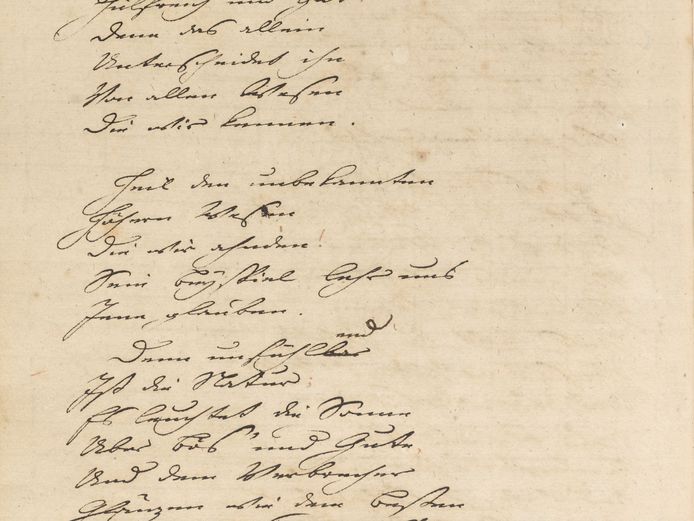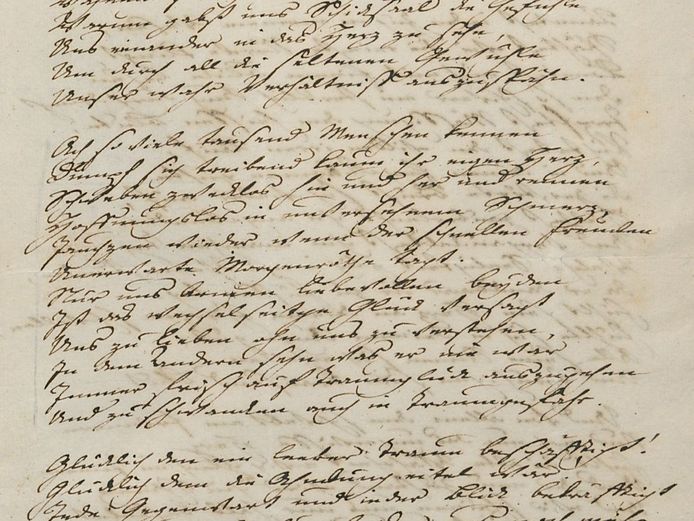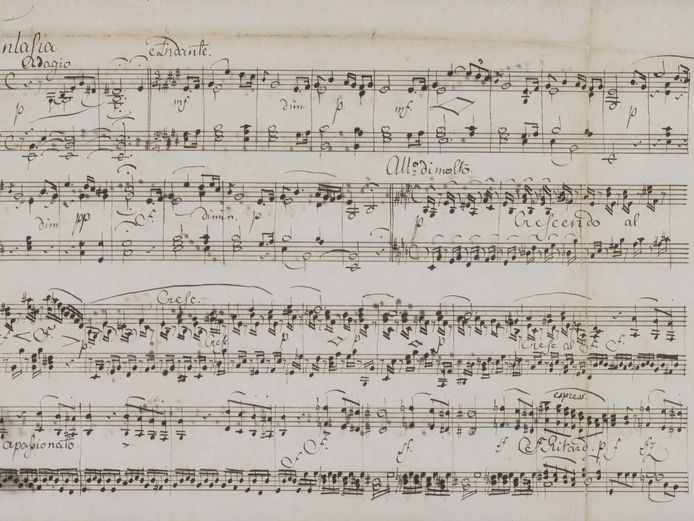Projects of the Klassik Stiftung Weimar are funded by the European Regional Development Fund (ERDF) and the Free State of Thuringia, represented by the State Chancellery of Thuringia, Department of Culture and the Arts.
Freundesgesellschaft
The Freundesgesellschaft des Goethe- und Schiller-Archivs Weimar e.V. (Friends of the Goethe and Schiller Archive Weimar) was founded in 2004 for the purpose of uniting individuals and institutions that are committed to preserving and expanding the unique holdings of the archive. The association supports the activities of the archive and draws public attention to its treasures. At present, more than 160 members from countries throughout Europe and the United States belong to the association.
In the first years after it was established, the association focused its efforts on supporting the restoration of the archive. After securing extensive public funding to finance the restoration programme in 2008, the association shifted its funding activities to the acquisition of rare manuscripts and autographs, e.g. letters by Goethe, Herder, Wieland, Johann Peter Eckermann, Ottilie von Goethe and Franz Liszt. Further donations helped secure the purchase of an extraordinary collection of Goethe autographs (2011), another “Phädra” fragment by Schiller (2016) and the short play “Rino” by Charlotte von Stein (2017).
Thanks to its publications, especially its series “Manuskripte” (issues 1-8) and its five facsimile editions of exquisite manuscripts, the Freundesgesellschaft has succeeded in reaching a large circle of interested philologists. Since 2014 the association has contributed to financing the publication of the archive’s exhibition catalogues.
„Many splendid things in life
Melt away in war and strife.
He who will protect, sustain,
Has thereby the most to gain.“Johann Wolfgang von Goethe (10 November 1826)
Contact
Freundesgesellschaft des Goethe- und Schiller-Archivs e.V.
Jenaer Straße 1
99425 Weimar
+49 3643 545 245
info@freunde-gsa.de
www.freunde-gsa.de
Johann Wolfgang von Goethe, “Das Göttliche” (On the Divine)
Goethe’s poem with the philosophical-ethical appeal “Let man be noble, Generous and good!” is one of the poet’s most famous verses. The first draft was put to paper in early November 1783 at the latest. In the poem, Goethe distinguishes man from “all the living beings we know“, from those in the “realm of nature”, for only mankind possesses the facility of reason, through which he can determine, direct and control his actions, and distinguish between good and evil.
Facsimile with transcription and commentary by Eva Beck and Edith Nahler. The manuscript is preserved at the Goethe- und Schiller-Archiv iin Weimar. The facsimile is printed in the original format on Gmund Original vergé creme (100 g/m2).

Johann Wolfgang von Goethe, Epistolary poem to Charlotte von Stein
After Goethe met Charlotte von Stein for the first time in winter 1775 in Weimar, the two began a regular and extended correspondence. Although seven years his elder and already married, Charlotte immediately drew Goethe’s fancy. We know from Charlotte that she was not equally impressed by the famous poet’s conduct and actions. But even without knowing the biographical context, the epistolary poem he wrote to her on 14 April 1776 is an extraordinary work of literature. In contrast to other poems he sent to Charlotte von Stein, Goethe chose not to publish this poem during his lifetime – probably on account of its intimate nature.
Facsimile with transcription and commentary by Eva Beck and Edith Nahler. The manuscript is preserved at the Goethe- und Schiller-Archiv in Weimar. The facsimile is printed in the original format on Conqueror structured (80 g/m2).


Felix Mendelssohn Bartholdy, “The Last Rose of Summer”
Very little is known about what inspired Felix Mendelssohn Bartholdy (1809-1847) to compose his Fantasy for Piano in E major, op. 15. It seems likely that he wrote the composition sometime around his first trip to England in 1829. The piece is based on the song “Tis the last rose of summer” written by the Irish poet and ballad singer Thomas Moore (1779-1852). The original manuscript is preserved in the Goethe- und Schiller-Archiv in Weimar.
Facsimile with transcription and commentary by Evelyn Liepsch. The facsimile is printed in the original format on Euro Bulk (135 g/m2).
If not his most important work, Friedrich Nietzsche’s Thus Spoke Zarathustra is unarguably his most famous. In poetic pathos, he describes the life and achievements of a fictitious thinker and itinerant philosopher.
The facsimile presents a scene from the chapter “Out of Service” in the Fourth and Last Part. The original manuscript is stored in the Goethe- und Schiller-Archiv in Weimar.
Facsimile with transcription and commentary by Steffen Kublik. The facsimile is printed in the original format on Gardapat 13 (90 g/m2).
The facsimile editions and the booklets 1-9 of the manuscript series by the Freundesgesellschaft are available for purchase at the Goethe- und Schiller-Archiv for 10 euros and 3 euros respectively.

